News & Announcements
- Details
- Written by Joshua Wachtel
 Photo of crime victims, Eliza and Blake Webb by Dean Rutz in the Seattle Times
Photo of crime victims, Eliza and Blake Webb by Dean Rutz in the Seattle Times
This remarkable story, by Christine Clarridge in the Seattle Times the other day, recounts what happened after a woman found a cell phone left behind in her ransacked car. The story begins:
"When Eliza Webb found a stranger’s cellphone inside her ransacked car last month, it didn’t take a lot of sleuthing to determine two things: one, the cellphone probably belonged to the person who’d prowled her car; and two, the culprit was likely a teen."
Because Webb worked with teens, and because her husband had faced many difficulties in life due to a "youthful indiscretion," she decided not to inform police and instead see what she could work out directly with the youth involved.
- Details
- Written by Joshua Wachtel
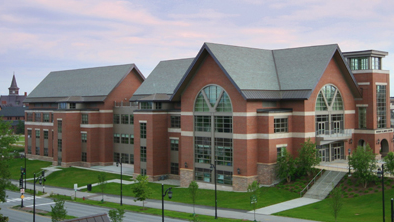 A call for papers has been issued for a conference titled "Restorative Justice, Responsive Regulation & Complex Problems" to be held at Davis Conference Center, University of Vermont, Burlington, Vermont, USA, on July 16 to 18, 2014.
A call for papers has been issued for a conference titled "Restorative Justice, Responsive Regulation & Complex Problems" to be held at Davis Conference Center, University of Vermont, Burlington, Vermont, USA, on July 16 to 18, 2014.
The announcement states:
Restorative justice offers values and practices to make regulation responsive to families and communities. Responsive regulation offers a framework to bring together the know-how of practitioners and regulators to solve complex problems. But little theoretical and empirical work is available to guide and unite their efforts. This conference seeks to encourage dialogue on activating citizenship and governance to address problems in a variety of environments and in respect of differing kinds of entities including governments, regulatory agencies, corporate organizations, neighborhoods, communities and families. Proposals are invited from proponents within the community, government, business, and academe on the integration of restorative justice and responsive regulation.
- Details
- Written by Laura Mirsky
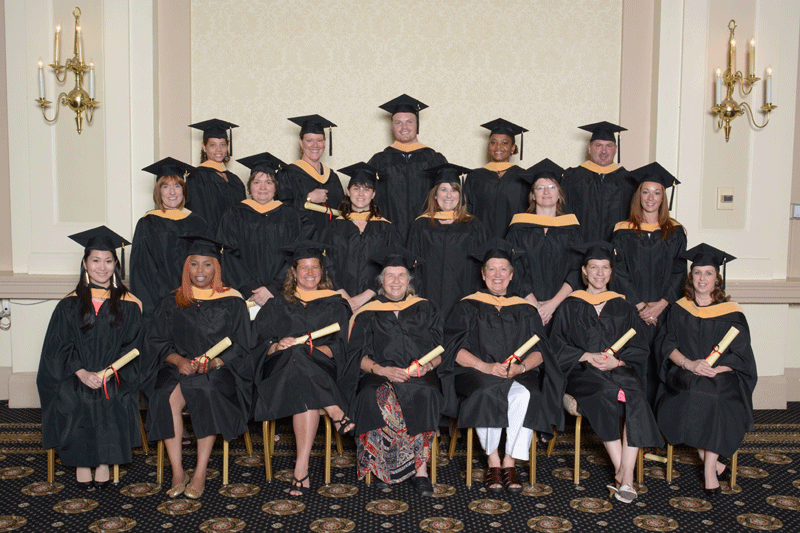 Congratulations to the IIRP's 2013 graduating class!The sixth class of master’s degree recipients graduated Saturday, June 22, in a joyous ceremony, at the Hotel Bethlehem, in Bethlehem, Pennsylvania, with their proud friends and family members cheering them on.
Congratulations to the IIRP's 2013 graduating class!The sixth class of master’s degree recipients graduated Saturday, June 22, in a joyous ceremony, at the Hotel Bethlehem, in Bethlehem, Pennsylvania, with their proud friends and family members cheering them on.
After IIRP president and founder Ted Wachtel presented the diplomas, the closing ceremony took place. In a tradition unique to the IIRP, instead of a commencement speaker, there was a brief demonstration of the restorative practice known as a circle. In a circle, each person is able to speak without interruption, allowing every voice to be heard. In this circle, nine graduates passed a “talking piece” (in this case, a microphone) and each one answered the question: “What is the most the significant thing to you about restorative practices?”
Here are just a few highlights of their responses: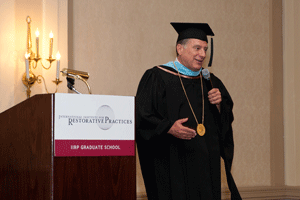 IIRP President Ted Wachtel
IIRP President Ted Wachtel
Cheryl Reider, a parochial school teacher from Harrisburg, Pennsylvania, said that prior to the program she had found herself “avoiding students who were challenging, whose behaviors were out of control.” The IIRP, she said, “has given me the tools to treat my students with respect but also to help them make positive change.” Now, she said, “I see students really experiencing what it means to take responsibility for their actions, to contribute to their own education in new ways.”
Diane Edgecomb, a child-protection attorney, guardian ad litem and mediator from Saco, Maine, said she had learned at the IIRP that the children and adults she works with have difficulty forming relationships because of past abuses, and that restorative practices gives them a second chance to learn how to be relational. She added, “It’s important that we look at the whole person, and indeed, we give back some of that whole person to them. We work with them to do that, not for them, and not to them.”
Kim Vindler, a school counselor from Haverford, Pennsylvania, said she had learned strategies that help her to build and maintain healthier relationships in all areas of her life, making her “not only a restorative practitioner, but a better person and a more effective professional.” She concluded, “My goal now is to give back to others and give them the opportunity to learn about restorative practices. I hope to join them in changing the world.”
Twenty men and women earned their degrees:
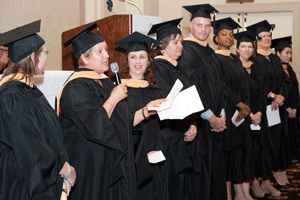 Graduate Joyce Dawley speaks during the commencement circle
Graduate Joyce Dawley speaks during the commencement circle
Master of Science in Restorative Practices and Youth Counseling: Elizabeth Ann Bertolet, Diane M. Edgecomb, Roberts E. Heiselmoyer, Lakeisha Atiya Horne, Karena Marie Malko, Sean Philip Plunkett, Naki Patricia Pratt, Cheryl Lynne Reider, Jason Michael Sauler, Dawn B. Schantz, Denise Marie Walsh, Sheila K. Weinhardt, and Ayane Yabui
Master of Science in Restorative Practices: Margaret Mary Murray, Jessica L Sine, and Michelle Jarrouj-Weaver
- Details
- Written by Joshua Wachtel
IIRP UK & Ireland held their 2nd Annual Conference, "Restorative Practice: The Way Forward in Salford," in partnership with Salford City Council at Salford City Stadium, on Thursday, June 20, 2013. The conference was attended by 127 people from all over the UK and Ireland.
- Details
- Written by Joshua Wachtel
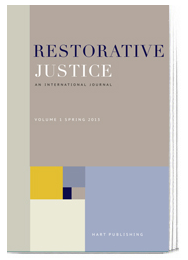 Restorative Justice: An International Journal has announced that its first issue is now in print. The journal is available from Hart Publishers. eForum subscribers are eligible for a discount. A sample, which includes the first four pieces in the journal, may now be downloaded.
Restorative Justice: An International Journal has announced that its first issue is now in print. The journal is available from Hart Publishers. eForum subscribers are eligible for a discount. A sample, which includes the first four pieces in the journal, may now be downloaded.
Contents of Volume 1. Issue 1. 2013
Editorial
An adventure is taking off. Why Restorative Justice: An International Journal?
by Ivo Aertsen, Stephan Parmentier, Inge Vanfraechem, Lode Walgrave and Estelle Zinsstag
"Words on words"
by Nils Christie
"Ten responses to 'Words on words'"
by John Braithwaite, Kathleen Daly, Jan Froestad & Clifford Shearing, Shadd Maruna, Gabrielle Maxwell, Christa Pelikan, Joanna Shapland, Josep Tamarit Sumalla, Lode Walgrave and Martin Wright.
- Details
- Written by Joshua Wachtel
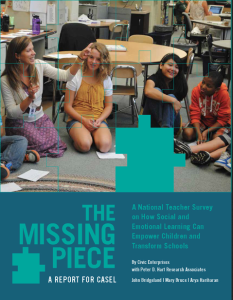 "From the schoolhouse to State House, 'academic skills' have been emphasized, tested, and reported upon, but another essential aspect of a child’s education — social and emotional learning (SEL) — has been underemphasized or altogether forgotten — with serious consequences to children, schools, and communities," write Jennifer Buffett, member of the Collaborative for Academic, Social, and Emotional Learning (CASEL) Board of Directors and NoVo Foundation President and Co-Chair, and Timothy Shriver, CASEL Board of Directors Chair and Special Olympics CEO, in an open letter to the American people.
"From the schoolhouse to State House, 'academic skills' have been emphasized, tested, and reported upon, but another essential aspect of a child’s education — social and emotional learning (SEL) — has been underemphasized or altogether forgotten — with serious consequences to children, schools, and communities," write Jennifer Buffett, member of the Collaborative for Academic, Social, and Emotional Learning (CASEL) Board of Directors and NoVo Foundation President and Co-Chair, and Timothy Shriver, CASEL Board of Directors Chair and Special Olympics CEO, in an open letter to the American people.
This letter appears at the beginning of a report released last month called "The Missing Piece: A National Teacher Survey on How Social and Emotional Learning Can Empower Children and Transform Schools," co-authored by John Bridgeland, Mary Bruce, and Arya Hariharan of Civic Enterprises with Peter D. Hart Research Associates.
- Details
- Written by Joshua Wachtel
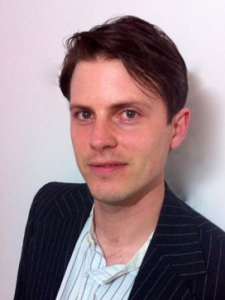 Tim Fisher, the family group conferencing manager in Camden, UK, discusses an innovative program to use FGC (also known as FGDM) with adults.
Tim Fisher, the family group conferencing manager in Camden, UK, discusses an innovative program to use FGC (also known as FGDM) with adults.
The following are excerpts from an article by Tim Fisher, the family group conferencing manager in Camden, UK, "What child protection can teach adult safeguarding - and vice versa." In this piece, which appeared in Community Care, Fisher explains how "At Camden Council we are following in the footsteps of local authorities like Hampshire and Kent by commissioning family group conferences for adult service users and their families."
Family group conferencing (FGC) has long since entered the mainstream of social work practice in children’s services, with three-quarters of local authorities commissioning child welfare FGCs, according to the Family Rights Group. Now increasingly FGC and restorative approaches are on the radar of commissioners in adult services, resulting in child welfare FGC professionals being asked to deliver adult FGCs and embarking on interesting collaborations with their adults' services colleagues.
- Details
- Written by Joshua Wachtel
Katy Hutchison, of British Columbia, Canada, lost her husband when he was brutally beaten to death by teenagers at a party in their neighborhood. Katy would later meet the young man who murdered her husband, and she now advocates and speaks about restorative justice. This moving talk incorporates the restorative lessons she learned from her father, the lessons she tries to teach her own children, and the restorative approach she believes would work better not only for addressing wrongdoing throughout society, but also for changing lives and building community through its use in schools.
- Details
- Written by Joshua Wachtel
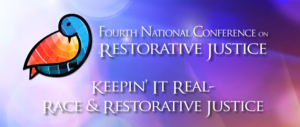 This Friday, June 21, at 9:15 am, IIRP assistant professor and director of continuing education Dr. John Bailie will present a breakout session titled, "Restorative Schools and Restorative Zones: A Whole-Community Approach to Limiting Youth Contact with Police and Justice Systems," at the Fourth National Conference on Restorative Justice in Toledo, Ohio. The theme for the conference is "Keepin' It Real – Race and Restorative Justice." John sent along the following to describe the scope of his talk, which is relevant to IIRP's work with diverse populations in urban areas:
This Friday, June 21, at 9:15 am, IIRP assistant professor and director of continuing education Dr. John Bailie will present a breakout session titled, "Restorative Schools and Restorative Zones: A Whole-Community Approach to Limiting Youth Contact with Police and Justice Systems," at the Fourth National Conference on Restorative Justice in Toledo, Ohio. The theme for the conference is "Keepin' It Real – Race and Restorative Justice." John sent along the following to describe the scope of his talk, which is relevant to IIRP's work with diverse populations in urban areas:
Restorative practices has the potential to offer an overarching framework, comprised of research-based interventions and interpersonal skills, which can transform how a complexly layered civil society develops social capital, builds community and responds to harm.
- Details
- Written by Joshua Wachtel
 A prison on the River Danube by Diana Allesok at Flickr Creative Commons."Talks Behind the Walls: Restorative Encounters in Prison Settings," a new paper by Dóra Szegő (Researcher, Foresee Research Group, Hungary) and Dr. Borbala Fellegi (Executive Director, Foresee Research Group, Hungary) published in the Internet Journal of Restorative Justice (IJRJ), tells a story of the promise and challenges of implementing restorative approaches in youth and adult prison settings in Hungary. The following excerpts explain the scope of the report:
A prison on the River Danube by Diana Allesok at Flickr Creative Commons."Talks Behind the Walls: Restorative Encounters in Prison Settings," a new paper by Dóra Szegő (Researcher, Foresee Research Group, Hungary) and Dr. Borbala Fellegi (Executive Director, Foresee Research Group, Hungary) published in the Internet Journal of Restorative Justice (IJRJ), tells a story of the promise and challenges of implementing restorative approaches in youth and adult prison settings in Hungary. The following excerpts explain the scope of the report:

Restorative Works Year in Review 2024 (PDF)
All our donors are acknowledged annually in Restorative Works.
